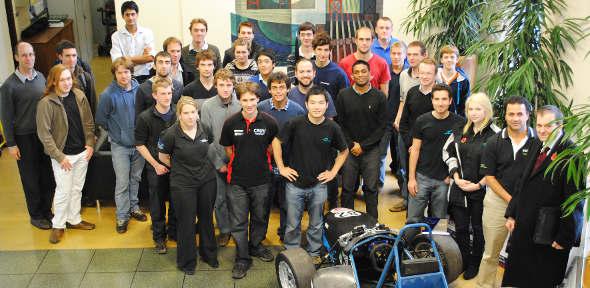
Student-led projects at the Engineering Department showcase the initiative, technical brilliance and team-working skills of our best students.
The projects have been of great value in terms of: educational and personal growth of the students; seizing public imagination around the World, raising the profile of modern engineering; and developing some really creative engineering solutions. The Student-led Projects and Industry Partnership (SPIP) exists to support student-led engineering projects at Cambridge and to facilitate interaction between industrial experts and students. The Partnership is generously funded and supported by Boeing, BP, Jaguar Land Rover and National Instruments.
The Department has a growing number of student-led projects each with a thriving team of students actively involved and making headway within their chosen field of interest. All of the student projects have their own individual sponsors, but the Department of Engineering provides an umbrella organisation called the Student-led Projects and Industry Partnership to make it easy for industry to learn about the projects and build links with the students involved. Industrial sponsors pay an annual subscription and are invited to regular forums. At each forum the student teams present the latest progress on their projects. The subscription money is allocated to the projects based on these performances and used to enhance specific facilities that the projects require in the Department.
A forum event took place last month. The industrial members present at the event were Richard Mills of the Boeing Company and Ajit Gokhale, David Baker and Hannah Wade of National Instruments.
Project presentations were given by the respective project leaders:
Cambridge University Eco Racing
Cambridge University Eco Racing design, build and race solar and electric powered cars. They have recently driven a vehicle across Australia, completing 1616 km under solar power. Fourth-year (MEng) projects are regularly run on topics which benefit the design of the car.
CU EcoRacing - Alisdair McClymont and Emil Hewage www.cuer.co.uk
Cambridge Autonomous Underwater Vehicle
The Cambridge Autonomous Underwater Vehicle team are working on a vehicle that can operate under the arctic ice. They have so far developed a stable and reliable hardware platform which was able to reach the final in the Student Autonomous Underwater Challenge Europe 2010 competition.
CAUV autonomous underwater vehicle - James Rickenbach www.srcf.ucam.org/cauv/
Cambridge Spaceflight
Cambridge Spaceflight work on the design and construction of low-cost systems for low cost suborbital access to space. They use a helium balloon to take the payload up to an altitude of over 30 km. From there, they plan to use a rocket to complete the journey to outer space (100 km up). The picture shows the launch of a balloon carrying the teddies from a local school as part of the group’s outreach activities.
CU Spaceflight - Daniel Strange www.cuspaceflight.co.uk
Full Blue Racing
Full Blue Racing is the Cambridge University Formula Student racing team. They design and build racing cars powered by motorcycle engines, and compete against other University teams at events in the UK and Europe. This year they competed in Formula Student UK on the Siverstone circuit and at Formula Student Germany on the Hockenheim circuit.
Full Blue Racing - Yunlong Xu www.fullblueracing.co.uk
Cambridge University Autonomous Flight
Cambridge University Autonomous Flight is an exciting new project started by a group of 15 enthusiastic engineering undergraduates aiming to design and build a micro autonomous air vehicle (MAV) and sharpen their skills in the fields of embedded systems, control theory, aerodynamics, project management and teamwork along the way.
CUAF autonomous flight - John Ginger www.srcf.ucam.org/cuaf
CUEWH engineering world health
Engineering World Health Cambridge is based at the Engineering Department working with local NGOs, in particular the Humanitarian Centre and Engineers Without Borders UK. CUEWH's primary aim is to use the team's engineering skills to help their partners meet healthcare needs in developing countries. To achieve this, they work with partner organisations who are able to effectively assess a healthcare need and highlight a problem, or set of problems, for CUEWH to try and solve.
If you have a great idea for a new student-led project or you are a company wanting to get involved please contact the coordinator, Dr David Cole email: djc13@cam.ac.uk

